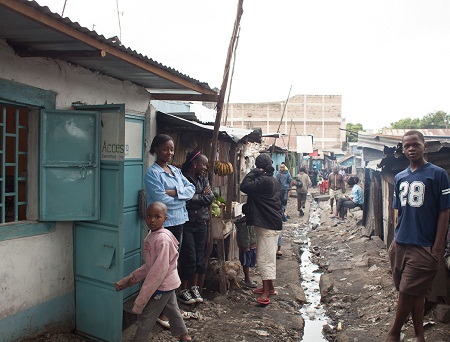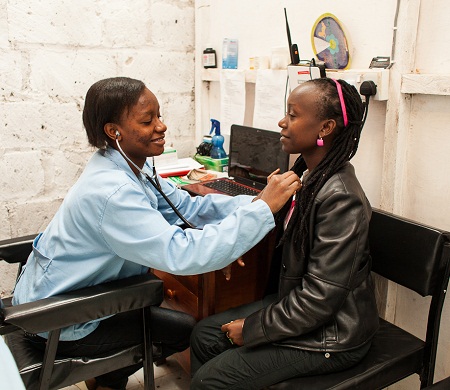Health Centers Paying Off in Kenyan Slums: Access Afya’s award-winning model is based on empowering clients
Editor’s note: Access Afya is a private, low-cost chain of health and wellness centers based in Nairobi, Kenya. It provides pay-per-use outpatient services to residents of the slums and is designed to be a safer, more reliable option than unregistered chemists and crowded free or public facilities. Access Afya runs two micro-clinics in Nairobi with plans to expand to four sites by the end of 2014 through grant funding. Access Afya was one of two winners of the Ashoka Changemakers and General Electric Foundation Health on the Ground: Uncovering Solutions That Save Lives competition. The other winner was Shining Hope for Communities’ PatientPower program.
Access Afya is redefining the care system for Nairobi’s urban slums. Our clients often do not have safe access to quality primary care. This means they frequently buy medicine over the counter from unlicensed, unsafe chemists. This is usually not the right treatment, and self-medication is creating a growing problem of antibiotic resistance in Kenya. Our micro-clinic model is lean: two shifts of two people run the facility, which is open 10 hours a day, seven days a week. It is designed for efficiency, fitting essential primary care services into an average plot size in the slums, which ranges from 100 to 200 square feet.
Despite common narratives about unwillingness to pay at the base of the pyramid, our pilot clinic has over 1,000 clients and has earned more than $4,500 in its first year. Patients pay an average of about $4 each, depending on which service they use. Monthly revenue increased over 150 percent in 12 months, and both sites are covering between 70-80 percent of their operating costs in 2014. With increasing word-of-mouth referrals, better marketing and branding materials, and sustained community outreach, we aim to have all four sites (current and planned) self-sustaining by the end of the year.

Building a business model is related to – but not the same as – building a business. Access Afya is growing a team of Kenyans passionate about improving the health sector. Our end goal is empowered clients who understand themselves, their bodies and how to mitigate risk. We use a few strategies to do this, including community outreach and marketing, partnerships with the public sector for priority care delivery, small, efficient micro-clinics and qualified health professionals.
(Staff outside the Access Afya mini-clinic in a Kenyan slum, left.)
So what does this mean for our model? We have seen a lot of activity in social franchising for health. We have been inspired from, learned from and even partnered with some of these models. But despite the potential to scale quickly with a franchise, we are not starting there. Each individual in our organization was hired for their skills and values, and is committed to our mission.
Clinical team members have autonomy to problem solve. Each week, we have team meetings to discuss challenges – both operational and client cases. We are creating a culture of planning, implementing, reviewing and improving. Clinical team members are also marketers and educators, going into the community to learn more about our clients and spread the word about our services.
For example, one of our nurses teaches sexual and reproductive health in high school biology classes to reach the youth in the slum.

This respect for individuals means ensuring opportunities for training, professional development and also giving them opportunities to share what we do. For example, Access Afya is part of a multi-country collaborative on primary care clinic chains. Our clinical officer spoke at a panel at the All Institute of Medical Sciences, sharing our model with the global health community. All clinical team members are guaranteed training each year, through continuing education, online learning and chances to present what they learned to their peers. This builds confidence in our team, knowledge in our organization and is in line with our social mission to improve a sector, and not just our bottom line.
(A consultation at Access Afya, right.)
Respecting the full team pays off. Access Afya staff like coming to work. There is healthy competition between the two clinics on who is busier and who can come up with the most creative marketing strategies. Our nurse summed it up best when he told an applicant at a recent interview, “We want people to come on board bought into Access Afya as a team – it is not about clinic success but the success of the organization.”
A dedicated team is our foundation for scale. We have taken a number of other actions to plan for scale: rigorous documentation of clinic start-up materials and processes, thorough supply chain management, appropriate service mix, electronic management of client and inventory data, branding, research on low-cost diagnostics and equipment to lower capital expenditure, and creating a pleasant patient experience. With the right model and the right people behind it, we hope to begin to roll out new micro-health centers quickly across urban areas in Kenya.
We are continuing to expand what we do, and we need more creative and critical thinkers to help us. Please do follow our progress online, let me know (melissa@accessafya.com) if you have any ideas for us and visit our website for current opportunities to join our team.
Melissa Menke is a social entrepreneur who co-founded Access Afya in Kenya.
- Categories
- Environment, Health Care
